Feelin’ Film is honored and excited to be covering the Toronto International Film Festival for the first time! This page will serve as a running journal, where you can read my thoughts on the many films I see both in-person in Toronto and via online viewing opportunities as the festival progresses. These early reactions will later be accompanied by more robust podcast reviews. For now, enjoy following along with my journey, see if anything sparks your interest, and be sure to let me know if it does. Thanks for reading. – Aaron White
- Note: Reviews published in order of most recently seen on top.
NYAD (dir. Chai Vasarhelyi and Jimmy Chin)

Rating:
Annette Bening is on another level as the titular athlete Diana Nyad in this dramatization of her remarkable accomplishment of swimming from Cuba to Florida without the aid of a shark cage while in her 60s. The award-winning documentary directing pair responsible for such tension-filled films as FREE SOLO and THE RESCUE create a fantastic energy, propulsive pacing, and include a nifty use of archival footage/audio which gives their first ever narrative feature an added factual flare. Diana’s story is truly spectacular and anyone who enjoys learning about extreme athletes that are built with a different determination is sure to find NYAD riveting. Jodie Foster is also phenomenal as Diana’s best friend/coach in what is sure to be one of this award season’s most rousing and inspirational films, a real life icon who willed herself to achieving the impossible by never giving up on a dream.
HIT MAN (dir. Richard Linklater)

Rating:
Richard Linklater’s new untraditional rom-com about a philosophizing pretend contract killer is SO. MUCH. FUN. and also extremely smart and clever in its use of roleplay to examine the evolution of identity. Powell, who portrays real-life chameleon Gary Johnson, a local professor that would create different assassin personalities in order to meet with nab potential employers, shows that he is that dude, a real movie star. It’s the best he’s ever been and his chemistry with Adria Arjona (who gives a knockout performance as a client who wants to have her husband killed turned romantic interest) is pure fire. The snappy script (co-written by Linklater and Powell) balances comedy and high-minded ideas about whether or not we can change who we are perfectly, and the easy breezy pacing and pure charisma of the cast make spending time in this world a delightful joy. It’s not quite like anything the director has done before, but easily his best in quite some time, and one of the revelations to come out of the festival this year.
A ROAD TO A VILLAGE (dir. Nabin Subba)

Rating:
A ROAD TO A VILLAGE is one of the great discoveries of the festival for me. Its premise is quite simple – a rural Nepali family struggles to adapt when a new road connects their once-remote village to the modern world. At times, you’d almost think this was a documentary with the way it is shot, and because of that it is highly effective at realistically conveying the lifestyle and emotions of the villagers. Primarily centered around a father and son pair, the basket-weaving dad finds himself out of work and facing a frustrated wife while trying to please a son who is enamored with the new technology, culture, and comforts that the road provides. Unfortunately, for all the good it brings, it takes something away, as well, and as they fight to maintain a balance that honors their heritage while accepting a new way of life, some deeply dramatic challenges emerge within the family unit itself and among their relationships with fellow villagers. Prasana Rai, who portrays the young boy Bindray, does a phenomenal job depicting a playful, curious child who sometimes doesn’t understand the change happening around him and the film features really lovely cinematography. From the village to the city of Dharan, I really got to know what these places were like, and appreciated experiencing the benefits and the dangers that growth come with a civilization’s growth.
LIMBO (dir. Ivan Sen)

Rating:
There is a reoccurring scene of a motel room bed seen from down the corridor inside of an old opal mining tunnel and it’s one of the most perfectly constructed shots of the year. Sen, the do-it-all director who also wrote, edited, shot, and composed the music for this feature, really has a brilliant eye behind the camera. Visually, the film is just a stunner. The black and white photography used throughout doesn’t only contribute to the neo-noir mood, but provides strikingly memorable images, creating a beautiful aesthetic for the mostly desolate sandy outback landscapes, dark interior caves, and close-ups of weathered, melancholic faces.
Tonally, LIMBO is definitely an Australian film. The story has minimal dialogue and is a slow-burn mystery about a white detective who comes back to an old outback town hoping to solve the 20-year old murder of an Indigenous girl. From Detective Hurley’s (Simon Baker) look to his drug addiction it’s impossible not to get Breaking Bad vibes, and there is frequent and blunt religious symbolism. Baker’s physical performance is a strength and Sen seems less interested in the murder itself than just observing the remnants of this broken town that is reckoning with the devastation and failure of a justice system. Despite little advancement of the plot, if you can get locked into its strong undercurrent of empathy, that and the dynamite aesthetic make for a satisfying tale.
THE TEACHER’S LOUNGE (dir. Ilker Çatak)

Rating:
Idealism is rarely the path with the most support. That’s the lesson that new junior high teacher Carla (Leonie Benesch) learns when she catches a glimpse of a school thief on video and attempts to set right a long-running witch hunt that has seen students unfairly accused and discriminated against. The script is incredibly smart in how it shows an entire school ecosystem breaking down. Teachers questioning students, teachers questioning teachers, students questioning students, parents questioning teachers – and of course the biased ways in which these situations can turn even worse. Benesch gives a gripping central performance as a teacher who truly cares about the kids and what is best for them even if they make mistakes. It’s inspiring and reminds us just how much of a difficult and thankless profession she is in. The film has a fantastic slow-building sense of anxiety which ratchets up throughout, creating a constant sense of nerves about where things are going to end up, and is backed by a wonderfully restrained score that adds to the tension without ever overdoing it. THE TEACHER’S LOUNGE at times feels like a naturalistic horror movie as we’re left aching for logic and truth to win out. Highly thought-provoking and also always entertaining, this is definitely one of the better international films of the year.
100 YARDS (dir. Xu Haofeng and Xu Junfeng)
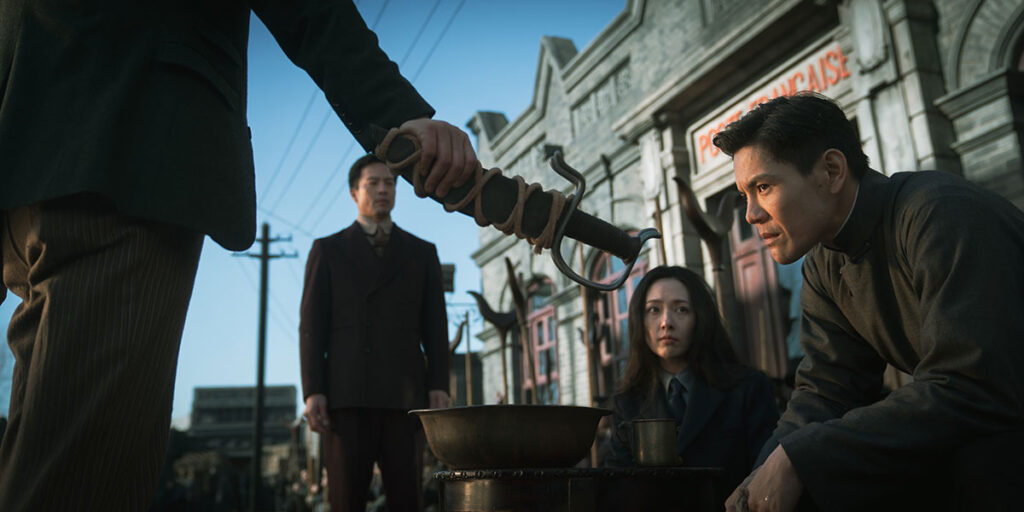
Rating:
There is an obvious authenticity to the martial arts combat we see portrayed in 100 YARDS. Director Xu Haofeng, who also handled the choreography for the film and is Taoist scholar with much historical knowledge, frames each fight like a dance. Whether using unique and varied weaponry or merely hand-to-hand styles, the almost entirely non-fatal version of conflict resolution we see is a delight to behold. Coupled with wonderfully effective sound design, every weapon and unarmed strike or movement is accompanied by a whoosh or thud, these duels and battles are very satisfying.
The story? Not so much. Set in the 1920s in Tianjin, China, a respected martial arts master dies and a clash erupts between his son and his academy’s most talented student over who will lead the school in his place. The master had been positioning his son for a life outside of the martial arts circle, but the young man stubbornly desires to follow in his father’s footsteps no matter the cost. The dispute escalates consistently and as it does rules of proper resolution are broken as each man tries to gain the upper hand and begins taking their fight from behind closed doors into the city streets. Narratively, it doesn’t get much deeper than that, and the often whimsical and intentionally silly style kept me at a distance. I rarely found its humor funny or its characters interesting, and anything other than one of the thankfully often exciting fight sequences struggled to hold my attention.
Had the writing leaned harder into the dramatics of the power play, what it means to disrupt centuries of tradition, and how the white foreigner influence plays a role in the future of their martial arts circle, instead of merely mentioning these things as background window dressing, or if instead it had leaned harder into the wackiness of its slingshot street gang and melodramatic romantic pursuits and not taken itself seriously at all, a stronger whole could have existed. Instead the resulting film is a sometimes engaging but too frequently boring tonal mix with characters and a story that I did not emotionally connect with at all.
PAIN HUSTLERS (dir. David Yates)

Rating:
There’s been no shortage of films about America’s opioid crisis in recent years, but rather than focusing on users or law enforcement, David Yates leaves the fantastical Wizarding World to adapt Evan Hughes 2022 narrative non-fiction book The Hard Sell — Pain Hustlers, which follows the rise and fall of a pharmaceutical startup and tracks their contribution to creating addicts everywhere. Emily Blunt is wonderful as always and shows a determined single mother with an incredible charisma and ability to sell. Meanwhile, Chris Evans is also quite fun as a morally bankrupt drug rep who will do anything to get ahead of the competition (and rich). Unfortunately, the film is still just formulaic Netflix fare. Yates is clearly trying to emulate Scorsese’s THE WOLF OF WALL STREET with its crazy high energy but PAIN HUSTLERS is much more sanitized and feels longer than its runtime. Worst of all, though, this story has nothing of value new or important to say about the opioid crisis and its occasional use of black and white photography testimonials from the family of victims doesn’t change that, but rather falls flat and feels tonally out of place. It’s a perfectly fine movie that is an easy watch, just don’t expect anything special whatsoever.
ORIGIN (dir. Ava DuVernay)
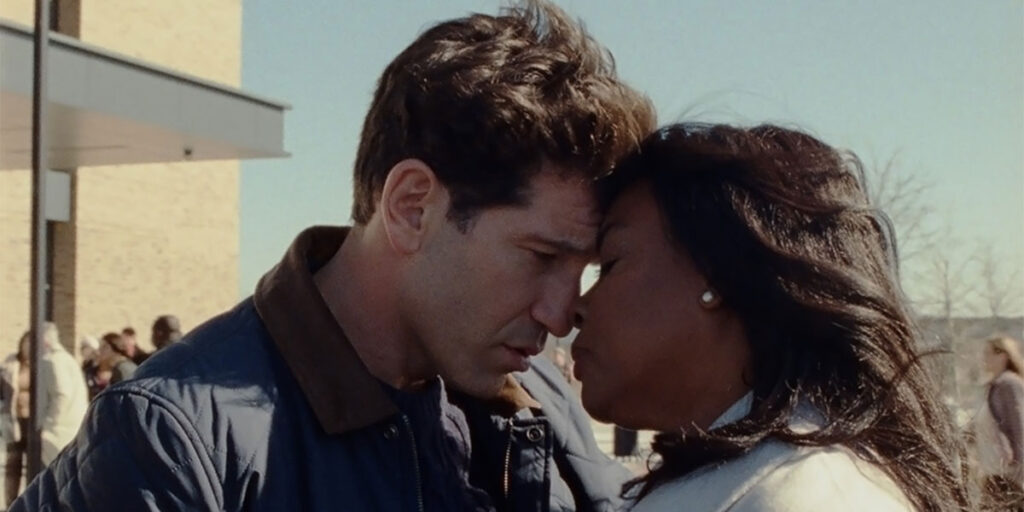
Rating:
Ava Duvernay’s adaptation of Pulitzer Prize winning author Isabel Wilkerson’s life feels pretty major to me. The story follows Wilkerson (Aunjanue Ellis-Taylor in a staggering Oscar-worthy performance) as she begins to research the nuances of discrimination and attempts to pinpoint the differences between racism and caste for what will become her New York Times bestselling novel Caste: The Origins of Our Discontents. The resulting work is a heavy, sweeping exploration about the history of caste worldwide in biopic form, featuring a combination of stylistic elements like voiceover narration from the book itself mixed with dramatized historical events. It’s a lot to take in, process, and talk about, but no one blends emotional and informational storytelling the way that DuVernay does.
CONCRETE UTOPIA (dir. Um Tae-hwa)

Rating:
When Seoul is reduced to rubble by a massive earthquake, only one of the numerous giant apartment complexes that populate the city is left standing. Almost immediately, self-survival takes center stage as the residents of the Hwang Gung Apartments begin taking steps to protect the comforts and resources that their building provides, rather than making them available to the many outsiders starving and freezing to death with nowhere to go. With no explanation about why the earthquake has occurred or what is taking place outside of the city, this story is less a traditional disaster movie than it is a story about how class warfare takes hold of humanity even in the darkest of times. The systems created by the apartment dwellers to not only survive but also maintain order are smartly developed and a lurking wolf in sheep’s clothing element adds an intriguing tension that builds throughout. Tonally, CONCRETE UTOPIA veers toward campy to its detriment a little too often but does find its footing enough to land an emotionally affecting ending. It’s a very standard plot, elevated by strong production values and fine performances, resulting in a highly entertaining parable.
NATIONAL ANTHEM (dir. Luke Gilford)

Rating:
You can really feel it when a director pours themselves into a story that is born out of personal experience, and Luke Gilford’s debut is a moving coming-of-age portrait about a soft-spoken young man discovering himself and finding a supportive community that brings him peace, joy, and acceptance. In intimate fashion, we follow Dylan (Charlie Plummer), a construction worker who is often left taking care of his younger brother while his Mom stays out late partying, as he takes a job on a queer rodeo performers’ ranch and begins to explore their world. He quickly is entranced by and begins to form a deep relationship with the ranch owner’s magnetic partner Sky (Eve Lindley), whose playfulness and openness attracts him in many ways. Some emotional conflict does arise as a sexually rambunctious encounter leads to jealousy issues and romantic commitments being challenged, but the drama is light. Through the vulnerable and tender performance from Charlie Plummer and captivating, magnetic work by Eve Lindley, we experience what it might be like for someone to unearth a part of themselves that they did not even know existed and be appreciated for who they are and how they act regardless of their sexuality or gender.
With Gilford’s background being in photography, it’s no wonder that he found a brilliant cinematographer to collaborate with, as well. Katelin Arizmendi provides gorgeous western landscape work that also features plenty of beautiful close-up shots to accentuate subtle emotions and strong relationship moments, particularly between Dylan and his little brother and Dylan and Sky. And as if he was already a seasoned filmmaker, Gilford’s confident pacing and direction help craft an undeniably emotive mood which enchants and allows plenty of time for introspection.
NEXT GOAL WINS (dir. Taika Waititi)

Rating:
American Samoa is bad at soccer. Honestly, the worst. The nation’s team made history during 2002 FIFA World Cup qualifying when it lost a match to Australia by the record tally of 31-0. This is the backdrop for NEXT GOAL WINS, which sees American Samoa bring on embattled Dutch manager Thomas Rongen (Michael Fassbender) to help turn the team around and accomplish their only objective – to score one single goal in international competition. If you’ve seen one inspirational sports comedy or drama, you’ve mostly seen them all. NEXT GOAL WINS is a typical crowd-pleasing story with the added bonus of wonderful representation which comes by way of a trans player named Jaiyah (Kaimana), who was the first openly trans female athlete to compete in a World Cup qualifying match. While I’ve grown quite tired of the alcoholic coach trope that is used here and frustrated by how Waititi insists on making 90% of the characters in his movie into comedic relief, to exhausting effect at times, it’s mostly very funny and good to see Fassbender back on the big screen for the first time in four years. Kaimana is the real star of this show, though, and gives a breakout performance that should hopefully land her more opportunities in the future.
KNOX GOES AWAY (dir. Michael Keaton)

Rating:
There is some serious irony when a movie about a character who is quickly losing memories is one that doesn’t leave a single lasting impression. In Michael Keaton’s second directorial effort, he plays an assassin diagnosed with dementia and the films takes place over about 3 weeks as he tries to get his affairs in order and redeem himself somewhat while simultaneously trying to help his estranged son out of a criminal jam of his own. Sadly, it’s not nearly as exciting or surprising as you’d expect a story like this with a ticking clock to be. Keaton directs it in a very dramatic fashion which creates major pacing issues. There also is an unfortunate lack of details that would help us to empathize more with Knox. It is briefly mentioned that he may only be killing other criminals, but there’s no world-building around why he does what he does. Al Pacino and James Marsden do provide some fun moments and Keaton as a performer is strong. It’s not a terrible film, just very bland, and it’s impossible to recommend when Christopher Nolan’s MEMENTO manages a similar type of scenario much better.
THE KING TIDE (dir. Christian Sparkes)

Rating:
THE KING TIDE has a fascinating premise about a mysterious girl with healing powers washing up on an island that has cut itself off from the world. The town uses the girl, Isla, for their own benefit and though they seem grateful (cultishly reciting “Many thanks to Isla”) any time she performs a miracle, the fact remains that she has very little free will. When the town’s fishing bounty begins to dry up due to Isla’s powers unexpectedly waning, tensions rise as differing opinions on how to handle their crisis emerge. The world-building is extremely interesting and the story explores how an isolated community intent on protecting itself can turn towards dark means to do so. There’s a shocking ending to this one that while entertaining left me feeling disappointed because of the lack of details about Isla herself and the broader impact of how what happened on the island affected the world at large outside of it.
UPROAR (dir. Paul Middleditch and Hamish Bennett)

Rating:
A teenage boy named Josh (Julian Dennison) is struggling. His Māori father passed away, his British mother works multiple cleaning jobs just to stay afloat, and his rugby star brother is out of competition with an injury. Josh has grown up loving rugby and thinking it was the only thing that he was supposed to do, despite not being particularly good at the sport. But then by chance two people come into Josh’s life and change everything – one being a teacher named Brother Madigan (Rhys Darby) who encourages Josh to try out drama class and the other being a local Māori girl and her family who are actively protesting Apartheid in South Africa and the discrimination against their own native people there at home. UPROAR then becomes a coming-of-age story about a young man finding his passion in life blended with the nation’s fight for its racial identity. Dennison & Darby make for a charismatic, witty student/teacher pairing and the film’s call to action about using your voice resonates. Plus, every movie is better when it includes a haka. Just a simple fact.
DADDIO (dir. Christy Hall)

Rating:
A woman (Dakota Johnson) exits the JFK are airport and enters NY city taxi cab, embarking on a ride home after a recent trip out of state. DADDIO isn’t about what happens next, because honestly, very little does, but it’s rather about the way that both she and her cab driver (Sean Penn) are changed from their brief time together. Christy Hall’s confident directorial debut is extremely strong, putting on screen what feels like a very precise vision. As she says, it is her love letter to those drivers and the sometimes rough but also meaningful encounters they can offer. The film is a gorgeously shot (particularly with how it frames the two characters in the rear view mirror from one or the other’s perspective), expertly performed, and an all-around riveting two-hander. The stirring naturalistic progression of their conversation ranges from topics such as tipping, to our relationship with tech, to gender dynamics, sex, and more. This is about reflecting on life, being present in the moment, and realizing that you never know when another person might be a part of changing your life – if only we listen and are honest.
THE HOLDOVERS (dir. Alexander Payne)
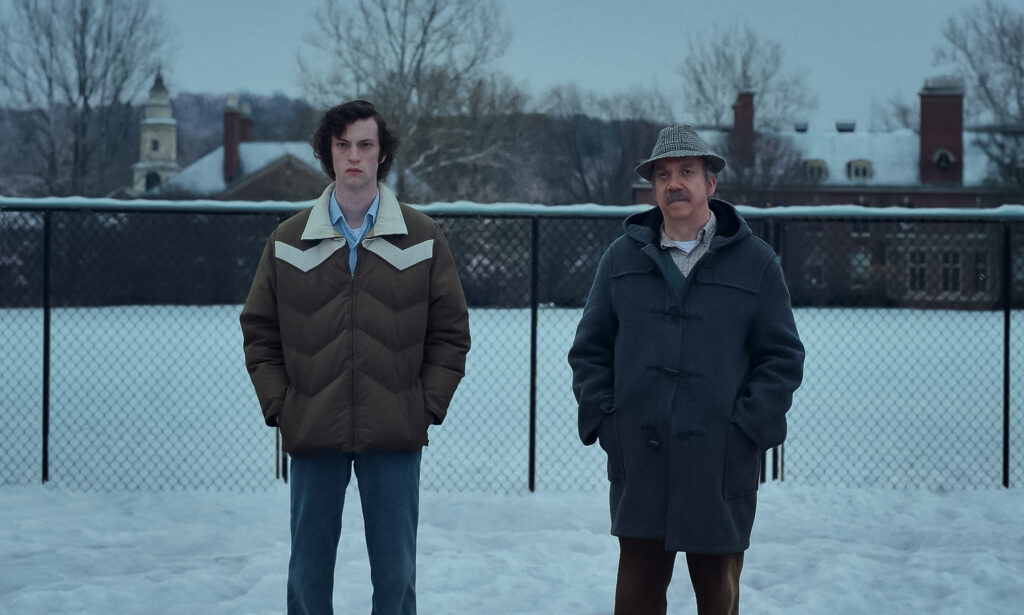
Rating:
There have been no shortage of stories told about the relationship between teacher and student, but Alexander Payne manages to take a familiar, simple formula and create something incredibly heartwarming, charming, and very funny. Mr. Hunham (Paul Giammati) doesn’t want to be left over the Christmas break to babysit a handful of prep school students who already don’t like him because of his traditionally tough educational style, and Angus Tully (Dominic Sessa) certainly isn’t excited about being left behind for the holidays while his mother and her new husband take off for a sunny honeymoon. The two clash frequently and have many hilarious interactions thanks to fantastic performances and a snappy script, but they ultimately find connection and encouragement in one another in ways they never good have imagined. Da’Vine Joy Randolph also stars and is delightful as the prep school’s cook Ms. Lamb. It’s such an accessible and moving picture, one that understands how everyone has buried pain somewhere in their lives and we could all benefit from being a little more empathetic. From the opening logos to the ending credits, THE HOLDOVERS is lovingly and perfectly made. Rarely can I say that I wouldn’t change a single scene or beat, but I truly have no notes, and enjoyed my time with these rich characters as much as I have with any in cinema this year. And if there is justice in the world, Paul Giamatti will have one heck of a memorable awards season.
KILL (dir. Nikhil Nagesh Bhat)
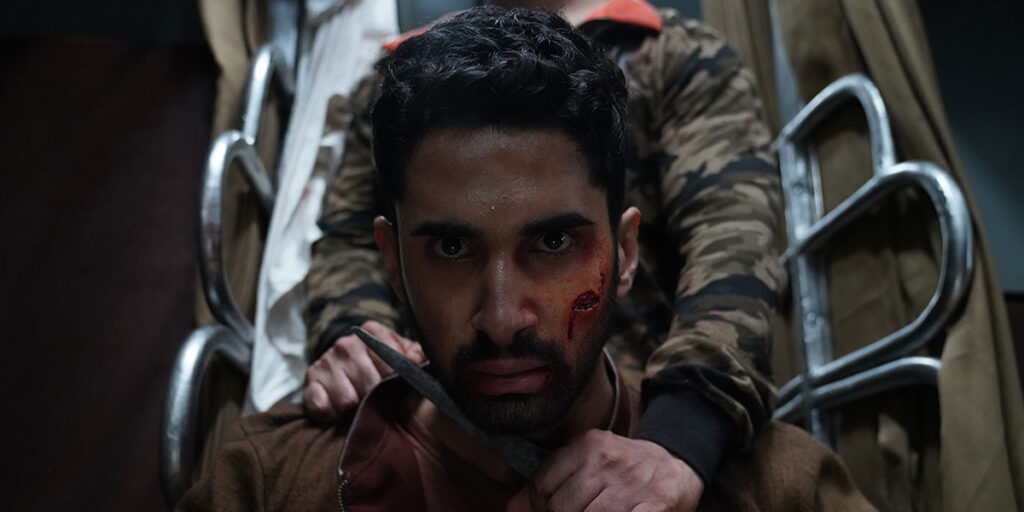
Rating:
The director and producer said point blank at a Q&A that with this film they had set out to make THE RAID on a train in India. Well, they succeeded. KILL’s narrative hook is extremely simple and may remind you of another famous film set in a tower. Two Captains in the Indian army, Amrit and Viresh, are on a train with Amrit’s secret love Tulika and her family as they travel to New Delhi for her arranged marriage. Unfortunately, this particular train is soon overtaken by dozens of bandits and sets in motion a rescue mission of the gnarliest kind. The music is loud, the pacing is fast, and the film is rarely more than a series of hyper violent and blood-soaked battles as Amrit fights to take down the gang’s maniacal leader Fani, played with incredible charisma by Raghav Juyal who is the absolute star of the show. Fight choreography in the confined spaces of these train cars is dynamic and the creative use of makeshift weapons makes for many a gasp-worthy scene. Though the narrative is not complex, it is surprisingly emotionally-driven, too, keeping you just invested enough to really enjoy the punishment dished out. But first and foremost this is an exercise in killin’ and the killin’ is gooooooood.
DEATH OF A WHISTLEBLOWER (dir. Ian Gabriel)
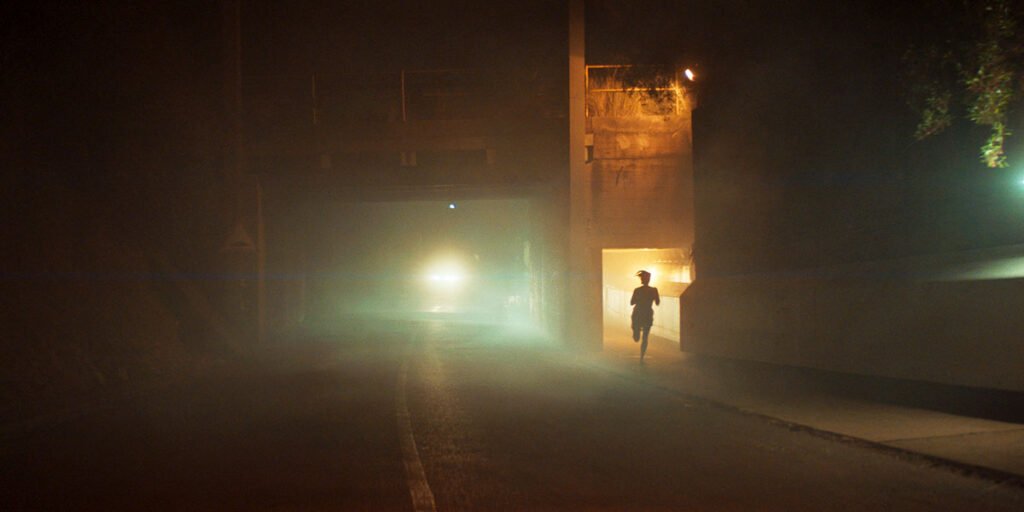
Rating:
There is a silly scene a little over halfway through DEATH OF A WHISTLEBLOWER where I laughed out loud and muttered “STOP IT” due to the impractical nature of what I saw taking place. Up until this point the film had maintained a fairly grounded and realistic portrayal of an investigative journalist seeking to expose a massive state conspiracy while honoring her murdered colleague who had been hot on this same trail and ultimately killed for it. But then she finds herself engaged in hand-to-hand combat with a mercenary assassin and the result is comical to say the least. It was also at this time, when director Ian Gabriel’s story had finally gained a sense of momentum and seemed to be barreling toward its conclusion, that I realized there were still 40 minutes left of this slog of a tale. But because integrity matters, I wiped my face with a cold cloth and carried on.
For Luyanda Misenda, telling the truth is all that matters. “Journalism is printing what someone else doesn’t want published. Everything else is public relations,” she snaps back at her editor after being initially denied permission to run a story on privatized prison corruption in South Africa. So it’s no surprise really that when her colleague, friend, and lover Stanley offers her an opportunity to join him in uncovering widespread government corruption and specifically something called Project Cursed (a plan to annihilate the black population in the country), it doesn’t take long for her to accept. Unfortunately, Stanley is assassinated right next to her shortly thereafter, and his death’s effect is to steel her nerves and set her on a dedicated path to exposing every layer of wickedness he had a lead on.
What transpires is a mostly slow-paced, dry, and dramatic procedural where Misenda is learning about a convoluted combination of horrors that includes the long-time state-sponsored genocidal program, the prison privatization scheme, chemical weapons trafficking, and a lot more. Every once in a while Gabriel will insert a two-minute scene that plays like a thriller, but these vignettes are infrequent and jarring due to their drastic tonal difference from how the story is primarily being told. Over the course of two hours that feels like four, Misenda teams up with a military corporal and the situation escalates from strictly investigative journalism into something that includes vigilante justice and revenge. While there are certainly the bones of a solid and intriguing story here, and one that reflects on the real life awful history of silenced truth tellers in this nation, the film never coalesces into an easily comprehensible and engaging whole. Noxolo Dlamini does give a strong performance as Misenda, but her work is hampered by the acting surrounding her, a lack of strong supporting characters, and a camera and script that never take advantage of the magnetic personality she flashes from time to time.
It’s a shame that a picture with this strong of a premise turned out to be such a bore. When my primary takeaway after a film ends is that I’m glad I didn’t waste two of my precious hours in Toronto watching it in person, that tells you all that you need to know.
THE BOY AND THE HERON (dir. Hayao Miyazaki)
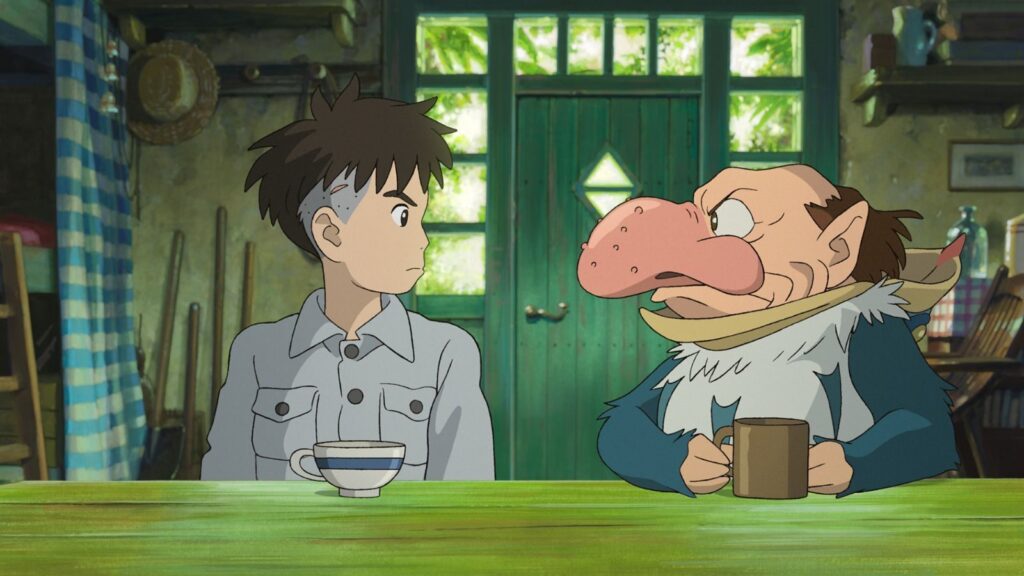
Rating:
Thematically, THE BOY AND THE HERON feels like a perfect swan song for Miyazaki, with its story that touches on memory and legacy in a big way. It’s so distinctly personal in the way it approaches passing the torch, in fact, that it almost hits a little bit differently now knowing that it likely won’t be the director’s last work. The story revolves around a boy named Mahito who loses his mother in a hospital fire during World War II. A few years later, he and his father move away from Tokyo to be with his new wife Natsuko, also his late wife’s younger sister. Much to my surprise, despite the obvious strangeness of that situation, it largely is not treated as one in the narrative. While at his new home, Mahito encounters a talking heron that beckons him into a magical world, telling him that he can find his mother there and save her. What follows is some a weirdly creative one-of-a-kind world that only Miyazaki could dream up, that includes knife-wielding human-eating giant parakeets and the details of a system for how souls are born. Though I did not find this to be the most engrossing or emotionally gripping story the director has told, its strong cast of characters both serious and quirky, stunning animation, one of Joe Hisaishi’s best scores, and a thoroughly exciting, energetic adventure make for a wonderful watch that no doubt has a richness begging to be revealed further for those who spend more time with it.
DUMB MONEY (dir. Craig Gillespie)

Rating:
Gillespie’s energetic and foul-mouthed biopic captures the millennial, perpetually online, meme-heavy essence of the historic GameStop short squeeze stock event perfectly. It’s propulsive, hilarious, and manages to be informational at the same time by simplifying the finance talk in a way that makes sense. The film never takes itself too seriously, leaning head on into the Reddit community culture that embraced a YouTuber called Roaring Kitty and collectively pulled off a massive Wall Street hedge fund takedown. DUMB MONEY is formulaic in the best way, echoing beloved films like THE SOCIAL NETWORK and THE BIG SHORT, and like those before it Gillespie’s picture is sure to be a crowd-pleasing triumph about a rare win for the little guys.
THE CONVERT (dir. Lee Tamahori)
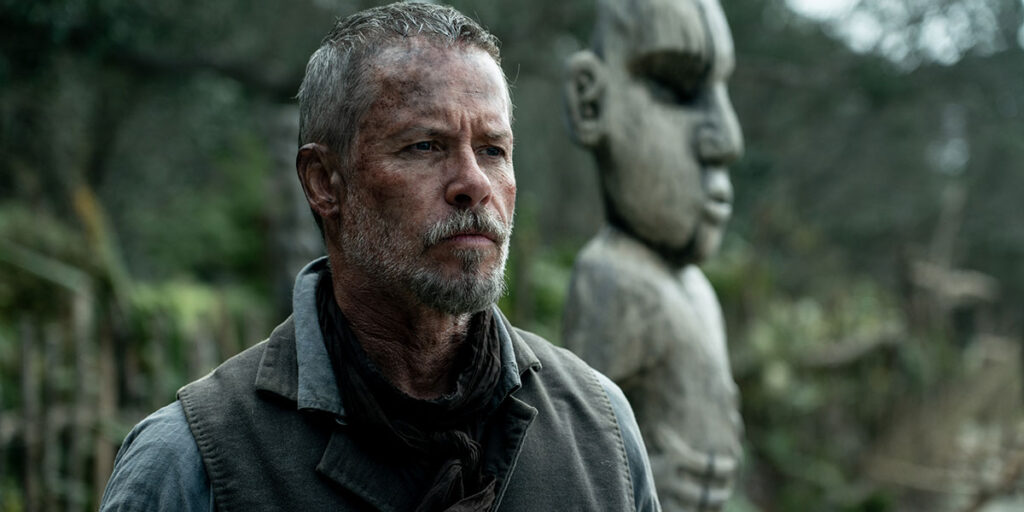
Rating:
THE CONVERT is a violent historical epic that shares the truth about Māori tribal traditions and the influence of British colonialism in their lands. Minister Thomas Munro (Guy Pearce) arrives at the colony of Epworth with pain from his past and the hope of finding redemption through leading its citizens in their religious routines. When caught in an unexpected attack, he begs for the life of girl Rangimai and becomes increasingly invested in the Māori ways of life and the conflict between two rival factions. Though the film never quite reaches the emotional heights of something like THE LAST OF THE MOHICANS, it is a rock solid adventure that doubles as a history lesson about a culture many know little of.
THE DEAD DON’T HURT (dir. Viggo Mortensen)
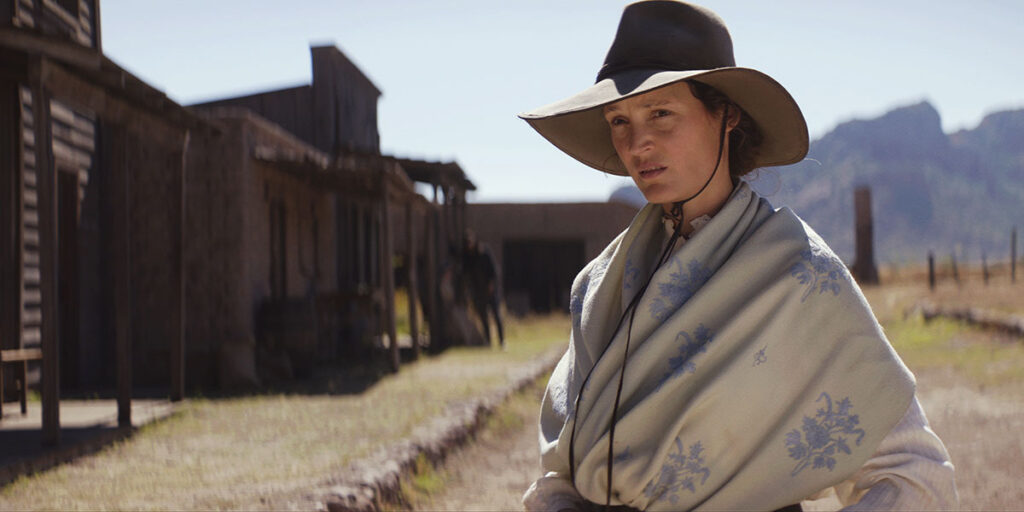
Rating:
Viggo Mortensen’s second directorial effort shows promise behind the camera, but there’s still room for growth. THE DEAD DON’T HURT is a Western immigrant love story and has moments of beautifully captured character interactions, gorgeous landscape scenery, and a captivating performance by Vicky Krieps as a woman who finds a home only to be left alone to defend herself against the evil intentions of a man from town. That’s not enough, however, to overcome a tremendously dull experience that is often robbed of potential momentum by a complicated flashback-heavy structure and a primary plot that doesn’t feel like anything new for the genre. The choice to bounce between about three timelines plus have dream sequences very much in the main offender here and does no favors to an altogether poorly paced affair with a camera that just lingers several beats too long practically every single scene. Make no mistake that the parts of a tender and exciting picture are here, but as constructed it’s just too much of a bore to strongly recommend.
WOMAN OF THE HOUR (dir. Anna Kendrick)

Rating:
Anna Kendrick does not shy away from a challenge. For her first film in the director’s chair, she tackles the very real story of serial killer Rodney Alcala (Daniel Zovatto), who posed as a photographer looking for models as a way to lure women into situations where he could sexually assault and ultimately murder them. What makes his life particularly unique is how during Alcala’s crime spree he appeared on television as a contestant in The Dating Game, where he attempted win the affection of Cheryl Bradshaw (played by Kendrick herself).
Zavatto is utterly terrifying, masterfully showing the kind of charisma and improvisational conversational skills that helped him gain the trust of so many victims, but also exhibiting a deeply upsetting, underlying intensity that occasionally betrayed his true violent desires. Be warned that there are some moments of terrible violence against women to be seen and Zavatto truly does get underneath your skin to the point of perhaps giving nightmares. Kendrick brings her signature charm and wit in front of the camera, and shows incredible command behind. She has crafted a tense, funny, and scathingly direct look at the many dangers and constant objectification women face. Details abound in depictions of interactions that women have with men and it’s damning to say the least. What Anna has accomplished here is so impressive. WOMAN OF THE HOUR is a knockout true crime story directorial debut.
DAYS OF HAPPINESS (dir. Chloé Robichaud)

Rating:
It’s impossible not to draw this conclusion so I’ll get it out of the way right up front – DAYS OF HAPPINESS has an awful lot of similarities to TÁR. Both films are about talented female conductors, both films see the lead in a lesbian relationship that includes a young child, and both films have conducting a Mahler piece as a major part of the story. The biggest difference, however, is that unlike Lydia in TÁR, Emma in DAYS OF HAPPINESS is a protagonist you actually root for.
Making Emma’s life a challenge are her obsession with perfection and inability to conduct emotionally, a toxic relationship with her over-bearing father who also serves as her agent and cares more about her career than he does her mental health, and a girlfriend who is not quite past a recent separation from her child’s father and isn’t ready to commit in the way that Emma would like. The resulting story is a slightly overlong but thoroughly satisfying dramatic character journey that has some delightful humor and plenty of lovely classical music to enjoy. Big time recommend for fans of the orchestra and anyone who likes a good tale of someone overcoming obstacles, in a healthy way, to achieve a dream.
SLEEP (dir. Jason Yu)
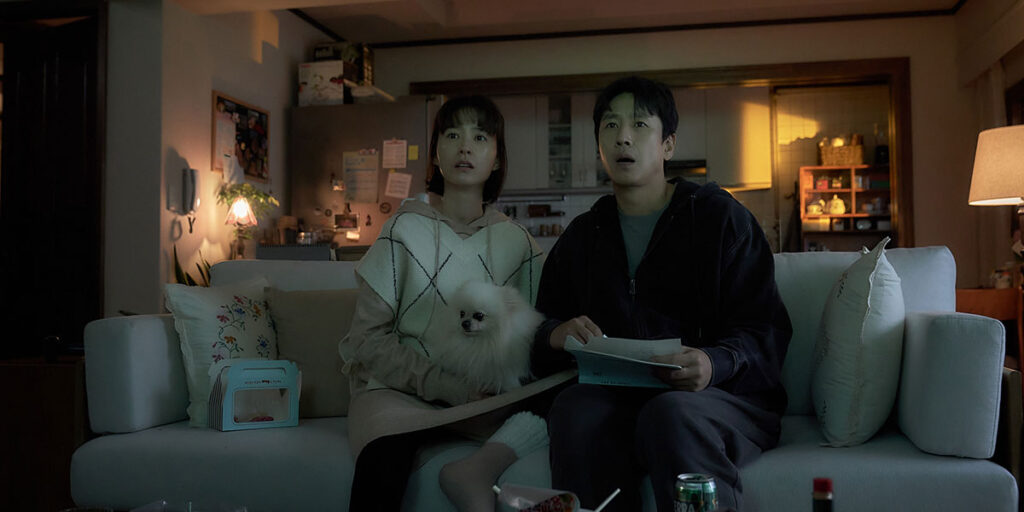
Rating:
You’ll look at your partner differently the next time they mumble in bed after seeing this. SLEEP hooks you instantly with its deceptively simple premise about a husband who talks and walks in his sleep with increasingly disturbing results. Jung Yu-mi and Lee Sun-kyun brilliantly depict a young devoted newlywed couple, pregnant with their first child, and in the meantime happily parenting their beloved Pomeranian Pepper. They live by the motto of “Together We Can Overcome Anything” and try all sorts of interesting and sometimes hilarious solutions to ridding Hyun-Su of his nocturnal affliction. The film is absorbing, tense, and smartly balances science and spirituality to craft a haunting atmosphere that deftly keeps you guessing right up until its anxiety-inducing dramatic climax. At its heart, SLEEP is a marital story about not giving up, and unlike Hollywood’s typical genre fare it foregoes the opportunity to set up a sequel in favor of a perfectly satisfying thematic ending. This is a fantastic debut from Jason Yu and another huge win for South Korean horror cinema.
HOW TO HAVE SEX (dir. Molly Manning Walker)

Rating:
HOW TO HAVE SEX may not make it obvious, but it’s so much more than just a party movie. Despite a propulsive, high-energy style of filmmaking with a blaring EDM score, Manning Walker’s story which follows three 16-year old British girls on a summer vacation full of partying, drinking, and on a mission to get laid in Greece, has a surprisingly strong and important message. The girls’ experience is all too relatable, from their poor choices to frequently over-indulge to the moments when they drop the facade of being older and show their age, this kind of debaucherous rite of passage is one many, many teenagers worldwide have partaken in. But this kind of unsupervised fun can be dangerous, too, and the film does a brilliant job of showing how subtly situations can go very wrong for young women and how critical it is to have friends that truly have your back with actions and not just words. As Tyra, Mia McKenna-Bru shoulders the most emotional and challenging arc of the three girls and gives an incredible performance that screams future star, and Manning Walker pulls no punches with her script, ending the film in a bold, realistic scenario that is heartbreaking, yet hopeful. Its final scene is powerful and one that I won’t soon forget.
PERFECT DAYS (dir. Wim Wenders)
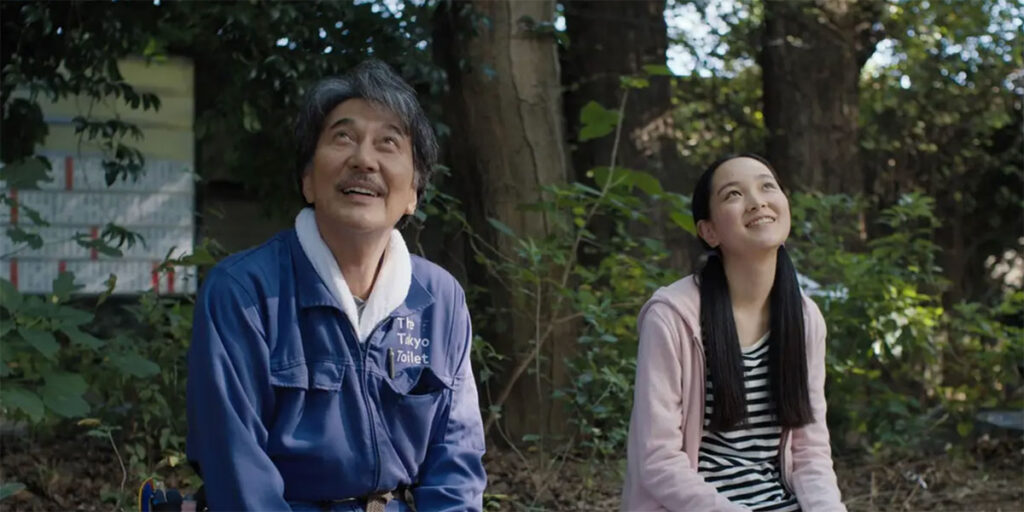
Rating:
According to director Wim Wenders, he was visiting Tokyo and found himself mesmerized by the many varied and beautifully designed public toilets added around the city to support the 2020 Summer Olympic. He was surprised at how well-kept and clean they and other public spaces were, specifically as opposed to how trashed the parks in his native Berlin had become, and was inspired to tell a story about Japanese hospitality and care for the common good. The result of that desire is a tender and charming character portrait of a quiet, kind, and respectful man who loves his work and serving others. His days are routine, consisting of things like filled with canned coffee for breakfast, American classic music on cassette tapes during his commute, and occasional photographs of the trees in a park where he takes his lunch. His relationships with a junior toilet cleaner named Takashi and his runaway niece Niko are delightful, and seeing a man who truly takes time to be present in every interaction and revel in the simple pleasures of each day is inspiring. Koji Yakusho is phenomenal as Hirayama and carries a film with perhaps too little story development for such a long and slow runtime. There’s a pleasant sweetness to be had, but it comes in a patient and simple style that can keep many viewers at a distance, and unfortunately left me wanting to know more about the fascinating Hirayama than Wenders is willing to share.
COPA 71 (dir. Rachel Ramsay and James Erskine)

Rating:
Composed almost entirely of first-hand, insightful, and passionate interviews from the many women who played in the titular soccer event and with plenty of wonderful archival footage to accompany its history lesson, COPA 71 thoroughly tells the story of the beginning of women’s organized play in many countries around the world up to a forgotten (perhaps intentionally buried) international competition that predates the first officially recognized FIFA Women’s World Cup by 20 years. The presentation is energetic and especially exciting due to practically no viewer already knowing the results of the tournament which results in a blended film style that feels like part documentary and part real live sporting event. It’s wonderful to see and hear these former athletes recount their memories with so much emotion – the joy of victories, the pain of defeats, and stories about the unbelievable experiences they had overall, from the parties to sight-seeing as tourists to bonding with other teams. American World Cup champion Brandi Chastain says it best at the opening of the film when she is exposed to this story for the first time, “It makes me happy and infuriated.” COPA 71 relays important history that deserves to be shared and goes beyond just sport as it highlights just how much inequality existed in the world for women not so very long ago.
THE ZONE OF INTEREST (dir. Jonathan Glazer)

Rating:
A unique and absolutely chilling look at the Holocaust from a German military family’s perspective. Instead of showing us the atrocities committed against the Jewish population by Hitler’s Nazy regime, Glazer instead has us spend time observing every day life at a beautiful house next to Auschwitz, watching as they enjoy amenities such as a swimming pool, greenhouse, and multiple servants all while being separated from the concentration camp by nothing but a greenery-covered wall. The result is a masterful juxtaposition of a life led in indifference and comfort vs. the non-stop off-screen horror, depicted by way of powerful and upsetting sound design. Though this makes up the majority of the film, the story does follow Commandant Höss away from the home as he takes on a larger role. This results in diminishing effectiveness for the film’s impressive structure and I wish that we could have just stayed with the Commandant’s selfish, callous wife instead. As it is, THE ZONE OF INTEREST is still a must-see unforgettable experience. It would have been a masterpiece of a short film, but still nearly perfect as is.
ANATOMY OF A FALL (dir. Justine Triet)

Rating:
Sandra Hüller’s emotionally complex performance as a novelist (also named Sandra) accused of murdering her husband and courtroom camerawork that brilliant shifts perspective to present a variety of character point of views elevate ANATOMY OF A FALL above your typical serial legal drama. Sandra’s challenging defense reveals the kind of unknown relationship issues that couples face and captures the psychological toll of publicly debating your truth without proof. It also showcases the awful effects of such a trial on her young son Daniel, a visually-impaired young man who has just lost his father and faces losing his mother while simultaneously trying to process details of their marriage that were kept private for good reason. Despite the murder mystery itself being setup well – seriously, the titular fall and questions that emerge about how it could have been either an accident or deliberate allows for some awesome suppositional theorizing – the story is drawn out to its detriment and left me feeling unsatisfied due to a lack of resolution. There can be power in ambiguity, but in this case it unfortunately limited my ability to empathize, and therefore stunted my emotional connection with what Sandra was experiencing. Still, Triet’s picture is a strong recommend as it is exceptionally well-made and one of the better courtroom dramas we’ve had in years.
HUMANIST VAMPIRE SEEKING CONSENTING SUICIDAL PERSON (dir. Ariane Louis-Seize)

Rating:
Sasha may be a vampire, but she doesn’t love it. For years she has fought against family pressure to become a selective killer in the name of self-preservation, instead suppressing her fangs and urges by feeding herself on blood bags and dreaming of what it might be like to eat human food, all the while developing a serious case of PTSD over the whole ordeal.
But then one night teenage Sasha sees teenage Paul atop a building, considering whether or not to jump. As fate would have it, their paths eventually cross during an unexpected meet-cute between boy and girl at a suicidal thoughts support group. Paul is a quiet and often bullied kid who is mesmerized by Sasha’s condition, and in wanting his life to mean something offers himself up as sacrifice. The relationship that follows is an adorably dry humor rom-com between two awkward depressed people as they navigate Paul’s potential dying wishes, find a special connection, and ponder their individual worth in a world that has dealt them each a challenging hand.
A lovely jazzy score helps contribute to the vibe and the cinematography is never showy, but decisions about when to use some stylish color bursts are smartly made and work to tremendous effect in creating a dark indie slice-of-life aesthetic. It’s also worth noting that for a film set entirely at night, the lighting work is top-notch, and unlike many pictures these days you can always clearly see characters and the world around them without ever losing the feeling that it is in fact in the dead of night.
Though the film features very few characters overall and isn’t full of memorable horror moments, spending time with Sasha and Paul is a delight and where the two wind up may encourage some healthy debate even after the credits roll. This is the kind of small budget, independent gem that makes festivals such a treat, and is worth seeking out and fitting into any attendee’s schedule.

































